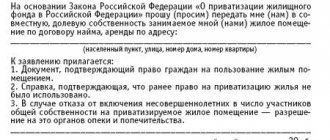Home » Housing disputes » Privatization of an apartment by military personnel under a social tenancy agreement
Military personnel, being citizens of the Russian Federation, have every right to privatize municipal housing on the same basis as everyone else. However, they are characterized by a number of problems that can complicate the procedure. However, this is not a reason to completely waive your right. How exactly you need to act in order to register ownership of an apartment - read in this article.
Grounds, conditions
The main basis for the privatization of an apartment by military personnel is the Law “On Privatization” No. 1541-1. In addition, you need to take into account RF PP No. 512. In accordance with current legislation, every citizen of the Russian Federation has the right to privatization once in his life. Thus, any military serviceman who is a citizen of the Russian Federation can privatize housing that he rents under a social tenancy agreement.
Privatization is possible for the following categories of military personnel:
- Living in the premises on the basis of a social tenancy agreement.
- Have served in the armed forces for at least 20 years.
However, this only applies to municipal apartments. The same types of military housing that are under the jurisdiction of the Ministry of Defense of the Russian Federation are not subject to privatization on the grounds that they belong to official premises. In addition, apartments cannot be privatized:
- In disrepair.
- In which unauthorized redevelopment was carried out.
- Located in gated towns.
Possible obstacles
The complexity of the process mainly lies in the presence of service status for residential areas. Having begun the procedure for registering premises as property, people encounter the following obstacles:
- The building in which the premises are located does not have an official owner or management company. The reason for this situation is the untimely completion of documentation when transferring departmental apartments to municipal ownership.
- The owner of the property is the Ministry of Defense. Such real estate is not subject to privatization, since it has departmental status.
- The apartment buildings have been transferred to the balance of the state, but the residential premises located in them have not received documentation from the BTI and Rosreestr. This fact makes it impossible to issue technical and cadastral passports for residential premises, since such buildings are not registered in the cadastral register.
All these problems delay the process, and in some cases make it impossible . Each specific case has its own characteristics and may have a different procedure for solving the problem.
Find out on our website about the rights and obligations of the owner and those prescribed in a privatized apartment, as well as what the owner of privatized meters will have to pay for out of his own pocket.
So, where to start the procedure?
How can a military man privatize service housing?
If the apartment is rented on the basis of a social tenancy agreement, then the general procedure is very similar to that implemented by citizens who are not serving in the armed forces of the Russian Federation. In the same case, when the housing is for service purposes, it must first be transferred to the ownership of the municipality and only then privatization should be carried out. In some cases, this requires going to court and defending your rights.
Example: A military serviceman rents an apartment on the basis of a social tenancy agreement. After some time, the RF Ministry of Defense formalizes this premises as official housing. According to the rules, this should only be done with the consent of the tenant. If it is not there, then the military man can, through the court, declare the fact of transferring the apartment to the service fund illegal, thereby effectively returning it to the ownership of the municipality. Further, he has every right to privatize this property.
Order
- Collect consent for privatization from all residents/family members. If for some reason one of them cannot or does not want to participate in privatization, he can write and notarize the refusal. It should be borne in mind that this is not a refusal of the very fact of privatization, but only of one’s participation in the procedure. As a result, such a person is automatically deprived of the right to his own share of housing.
Example: The wife of a serviceman cannot participate in privatization, since she previously spent her right by receiving ownership of an apartment from the state. She can write a refusal, thanks to which the serviceman has the right to register the apartment in his own name. Due to the refusal, the wife will not be able to receive her share, but nothing prevents the husband from donating part of the apartment to his wife after registration of ownership.
- Collect a package of necessary documents.
- Contact the property owner with an application for privatization. It is easier to do this through the local branch of the MFC.
- Get permission.
- Sign the privatization agreement.
- Register ownership.
Procedure
Obtaining the consent of all residents is a fairly simple step, but only on the condition that one family lives in the apartment and normal relations have developed in it. In any case, this consent is necessary; without it, privatization is not possible. Alternatively, a person can refuse to participate in the procedure, but must agree with the very fact of its implementation. If there is no such agreement, a compromise will have to be sought.
Consent is required from all family members, including children over 14 years of age.
After collecting consents, you need to start preparing documents. It is recommended to start with the BTI registration certificate, since it is usually the one that takes the longest to complete, which is why some of the documents may expire. When everything is ready, you need to contact the MFC or local administration. There the application is reviewed and, if there are no problems, a privatization agreement is drawn up. By signing it, the housing user will be able to become its owner by registering ownership in Rosreestr.
Documentation
To successfully submit an application, you must attach the following documents:
- Passports of all residents, including children. For those children who do not yet have a passport, a birth certificate is required.
- Permission from the guardianship authorities for privatization (relevant only if there are children).
- Extract from the Unified State Register (USRN) (issued by Rosreestr).
- BTI technical passport.
- An account statement confirming that there is no debt on the apartment.
- Social tenancy agreement.
- Consent of all residents or a notarized refusal.
- Power of attorney for a representative (if required).
The application for privatization can be filled out on the spot, immediately before submitting documents, or prepared in advance:
Deadlines
The entire privatization procedure will take about 3-4 months, most of which you will just have to wait. First, until all the documents are prepared. In particular, the technical passport of the BTI. In some cases, it can be done even for more than a month. Then you need to wait 2 months until a decision on privatization is made. And the last step is to wait until the registration certificate is ready. In some cases, this may take another 1 month.
Price
During privatization you will have to incur the following expenses:
- Payment of state duty: 2000 rubles for each resident participating in the procedure.
- Registration of a BTI registration certificate: about 1-2 thousand rubles. Specific prices depend on the region of residence.
- Extract from the Unified State Register of Real Estate: 300 rubles.
- Refusal from privatization: 200-1000 rubles.
- Registration of a power of attorney: 1-2 thousand rubles.
Privatization for family members of a military personnel
Is it possible to privatize housing from the Ministry of Defense for my wife?
The special status of the military in terms of social protection extends to members of their families.
Benefits provided by the military in the event of their death can be used by close relatives.
First of all, the widow of a serviceman who died in service has the right to housing. However, this benefit has a limitation. The wife of the deceased can privatize official real estate or get a new one only before the registration of a new marriage.
living in housing provided by the Ministry of Defense writes an application and draws it up in her name .
If a rental agreement was not previously concluded with the residents, the wife of the deceased becomes the tenant. The documents will need to be accompanied by a Military Death Certificate and a Marriage Certificate.
You can privatize an apartment in the name of relatives of a military man only with his consent, subject to his refusal of the share, which makes it possible to register the apartment in the name of any family member registered in it.
If refused
Owners do not always agree to privatization. Refusals often follow; another thing is that they may be illegal or inadequate.
Reasons for refusal
Privatization is often refused for the following reasons:
- All required documents were not provided.
- The apartment is classified as real estate that cannot be privatized.
- The applicant previously participated in privatization.
In the first case, you just need to collect all the papers and repeat the request. But in other options nothing can be done. At the same time, there are often other reasons for refusal that can already be challenged in court:
- There are debts. Formally, according to the law, debts cannot be a reason for refusing privatization. However, if you try to get your way through the court, you will still have to pay off the debt. For example, the court may agree that in this case privatization is possible, but only if the entire debt is transferred to oneself (usually it hangs on the apartment, and therefore on the municipal owner).
- The apartment became a service apartment after signing a social lease agreement. If there was no consent of the residents, then such actions are considered illegal and the court may well agree to accommodate the potential owner.
Other reasons are rare, but in each individual case they must be specified in writing. If you can fix something yourself, you should do so. Otherwise you will have to go to court.
Procedure for going to court
- Receive the refusal in writing. This should be an official document, signed and stamped, not just a piece of paper stating what needs to be corrected.
- Draw up a statement of claim based on the refusal received.
- Prepare other documents indicating that the applicant is correct.
- Submit an application to the court.
- Wait for consideration and defend your point of view. This can be done in person or with the help of a legal representative.
- Get a solution.
- Wait for the decision to take effect.
- Based on this document, continue the privatization procedure.
It should be taken into account that while the application is being considered by the court, some documents may expire, which is why they will have to be re-issued when re-submitting an application for privatization.
Procedure
The trial procedure directly depends on what exactly caused the refusal. If there really is a violation and the applicant is completely right, then the issue will be resolved very quickly. But the opposite is also true. If there are disputed data, they will need to be clarified. And the more documents a person can collect, prepare and provide in advance, the easier it will be for him to prove that he is right.
Documentation
When submitting an application to the court, you must attach the following documents:
- Applicant's passport.
- Documents for the right to use the premises.
- Papers proving the plaintiff's case.
- Refusal to privatize.
- Registration certificate and other documents relating to the apartment.
- Receipt for payment of government services.
- Power of attorney for the representative and his passport (if required).
Sample statement of claim for privatization of an apartment by a military personnel
Deadlines
The period for consideration of the application and the hearing depends on many factors, but only in rare cases are such cases completed with one or another result earlier than 2 months after filing the claim. In addition, usually about 1 more month is given for an appeal, which is why the application does not take effect immediately. In total, the average period is 3 months.
Price
The main expense item that you cannot do without will be the payment of state fees. This is 300 rubles. In addition, you may need the services of a notary - from 500 rubles and some additional documents - from 200 rubles.
Arbitrage practice
Example No. 1: A serviceman uses housing under the right of a concluded rental agreement. After some time, he decides to privatize the property, but is refused on the grounds that the apartment is a service apartment and therefore cannot be registered as the property of a tenant. Not agreeing with this decision, the serviceman goes to court with a demand to allow him to privatize, but the court also decides that the refusal was lawful, since, firstly, the apartment is indeed a service apartment and became such long before the conclusion of the lease agreement. And secondly, the housing is located on the territory of a closed military camp and therefore is not subject to privatization in principle.
Example No. 2 : The apartment was previously registered in the name of the Ministry of Defense, but after some time it was transferred to the balance of the municipality. However, housing continued to be rented out to the military. Another user decides to privatize an apartment, but encounters a refusal based on the fact that the owner is the Russian Defense Ministry, which means the apartment is classified as a service apartment. Having collected the necessary documents, the serviceman files a claim in court and proves there that even before he signed the rental agreement, the RF Ministry of Defense transferred the housing to the balance of the municipality and therefore the person can rightfully exercise his right to privatization. The court's decision will be in his favor.
Registration through court
In case of refusal or if the housing has departmental status, privatization is possible only through the court.
The subject of the claim will be a demand to remove the official status from the premises .
Before going to court, you must send a request for permission by registered mail to the Housing Department of the Ministry of Defense. The response received will serve as the basis for filing a claim in court.
If the organization has not sent a response, the basis may be a copy of the letter sent to its address and a receipt for its payment. The letter must be sent 60 days before filing a claim with the court.
The rules for drawing up a claim are regulated by Articles 131, 134 of the Code of Civil Procedure. You should contact the courts of military garrisons or districts at the location of the property , or the military board of the Armed Forces of the Russian Federation.
The statement identifies the parties to the trial in court and information about the location of the object. The descriptive part must contain the substance of the dispute and references to the norms of the laws of the Russian Federation. The application must be completed with a requirement to privatize the property.
The application is accompanied by a package of documents identical to those previously listed. Consideration of the claim is scheduled 5 days from the date of its receipt.
The procedure through the court has a number of subtleties and features, so it would be more advisable to enlist the support of an experienced lawyer.
Such cases are quite complex , so their consideration can last about 2-3 months. Delays are most often associated with the need to remove the official status from the premises or difficulties in registering buildings with cadastral registration.
A positive court decision is the basis for completing the process. The court ruling, along with a package of documents, is submitted to Rosreestr or MFC, and the parties to the agreement receive Real Estate Certificates.
to privatize real estate located in a closed military camp even through the courts. However, the family of a serviceman can live in it indefinitely, even after his retirement.
Possible difficulties
The following difficulties may arise with housing for military personnel:
- Regardless of the basis on which the serviceman lives in this premises, he is obliged to notify his command of his current or new address.
- In some situations, service housing can be voluntarily, at the request of a military man, transferred from the balance of the RF Ministry of Defense to the balance of the municipality. This is usually done just so that a person can privatize it. It is recommended that you try to solve the problem this way first.
- Many military personnel retain the right to live in a service apartment even after retirement. However, this does not mean that they automatically receive ownership of it or have the right to privatize this premises.
The procedure for privatizing housing for military personnel is practically not described in the legislation. As a result, one has to be guided by the norms that apply to everyone. As a result, disagreements and numerous problems may arise. You can deal with them with a free consultation from our experienced specialists. In addition, lawyers will help not only directly with privatization, but also with a lawsuit in court.
FREE CONSULTATIONS are available for you! If you want to solve exactly your problem, then
:
- describe your situation to a lawyer in an online chat;
- write a question in the form below;
- call Moscow and Moscow region
- call St. Petersburg and region
Save or share the link on social networks
Author of the article
Natalya Fomicheva
Website expert lawyer. 10 years of experience. Inheritance matters. Family disputes. Housing and land law.
Ask a question Author's rating
Articles written
513
- FREE for a lawyer!
Write your question, our lawyer will prepare an answer for FREE and call you back in 5 minutes.
By submitting data you agree to the Consent to PD processing, PD Processing Policy and User Agreement
Useful information on the topic
3
Appeal against a court decision to evict an apartment
Eviction lawsuits are quite common. Often the defendant’s position on...
2
Eviction without provision of other accommodation
Can a citizen be left homeless if for some time...
3
Statement of claim for eviction of ex-spouse from residential premises
Having officially dissolved the marriage, the former spouses cease to be relatives, all of them...
5
Statement of claim for eviction and deregistration
The tenant violates all conceivable and inconceivable rules of the hostel. Ex-husband…
Privatization of a share, part in a municipal apartment
Privatization of an apartment is an inalienable right of any citizen of Russia. However, not...
2
Forced eviction of the owner from the apartment
The citizen is the owner of the residential premises. It doesn’t matter if he bought it, privatized it,...
Refusal to privatize
Among the main reasons that entail a judicial refusal to privatize residential premises for military personnel are the following:
- illegal redevelopment in privatized living space;
- the applicant does not have privatized housing, if the living space was allocated to a serviceman and his family without signing a social tenancy agreement with the owner;
- identification by authorized organizations when considering the problem of housing privatization of fake documentation containing incorrect information;
- lack of necessary documentation for the privatized apartment (in case of loss or loss). In this case, the applicant is given time to restore the lost documents;
- use in the past of military personnel of the right to free privatization of housing. As a rule, each citizen can use this right only once in his life.
Important!
Consideration of the problem of privatization of housing may also be terminated by the judge in connection with the death of the plaintiff or with his move to a new place of military service and, of course, a new place of residence.
To complete privatization, a serviceman who has a positive decision from a judicial authority must register his acquired right to living space in the Unified Register. The privatization agreement and registration certificate will provide documentation confirming the privatization.
ATTENTION!
Due to recent changes in legislation, the information in this article may be out of date!
Our lawyer will advise you free of charge - write in the form below.
Step-by-step instructions for privatization
A serviceman who wants to “de-service” an apartment needs to contact the appropriate unit of the Ministry of Defense of the Russian Federation - the Housing Department (Housing Support Department), with an application to register the apartment as private property free of charge. After submitting your application, you will need to wait for a response within one month. If the answer is yes, the department will issue a list of necessary documents that will need to be provided to conclude an agreement on the free transfer of residential premises into the ownership of a citizen. The final stage is the execution of a gratuitous agreement on the transfer of living space into the ownership of a citizen. At the same time, the serviceman must receive technical documentation for the apartment at his own expense. Privatizing an apartment for military personnel is a lengthy process and you need to be patient.
To begin the procedure of “de-service” of a residential premises, you need to provide: your own statement outlining a request to transfer the desired property into private ownership; notarized written statements of their family members who refused to participate in the privatization process; original and copy of the social rental agreement; originals and copies of passports participating in the procedure; technical passport, extract from a financial personal account, information from the house register or a certificate from the management company (ZhEK) about the persons registered in the apartment; information about the owner of the transferred property (if ownership is registered); a copy of the military department’s certificate of title to real estate (if available); extract from the service record; information about the applicant’s right to privatization (certificate of unused right); permission from the military department unit dealing with housing issues for privatization or information about the absence of complaints about the procedure being carried out. In addition to copies, the package of documents must also contain originals.










